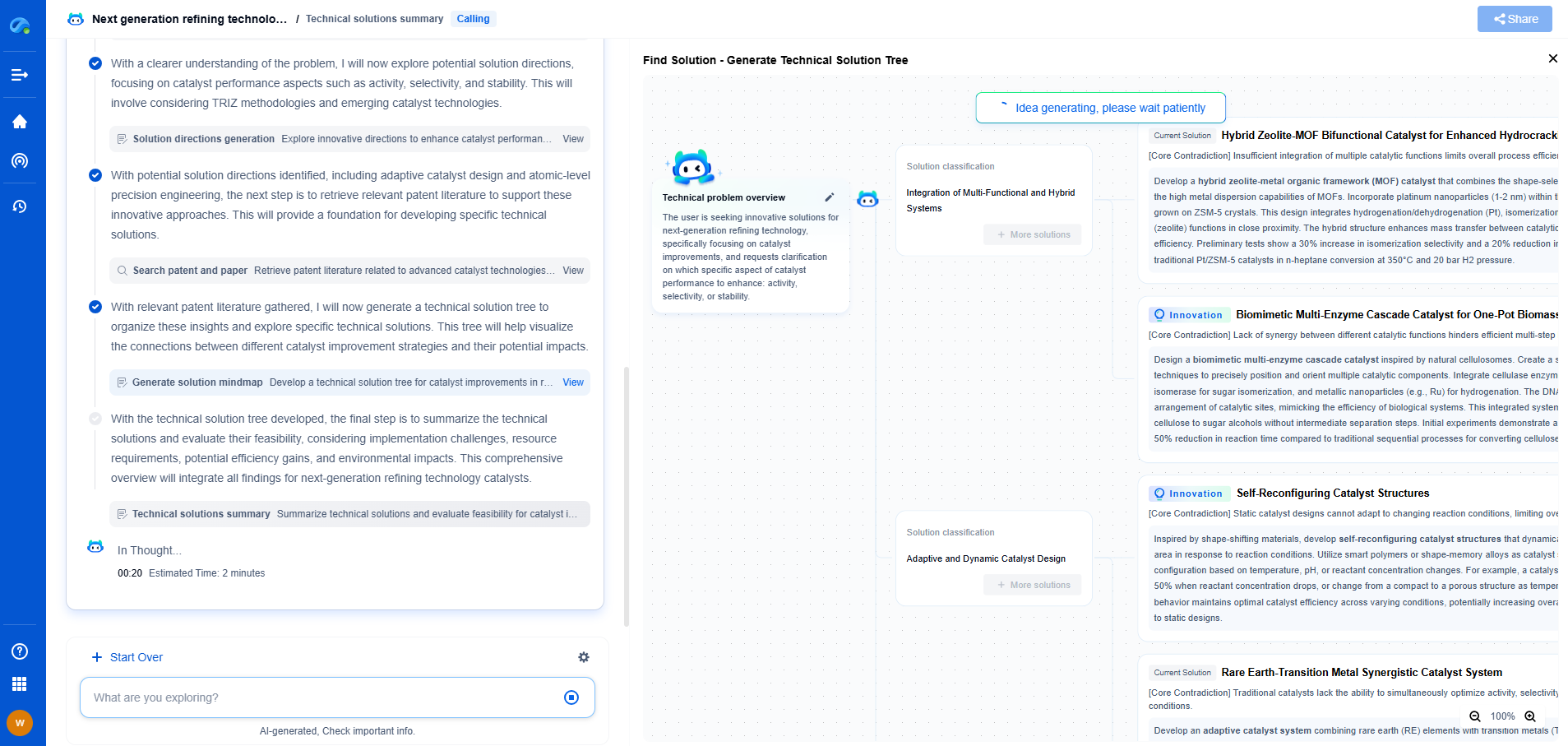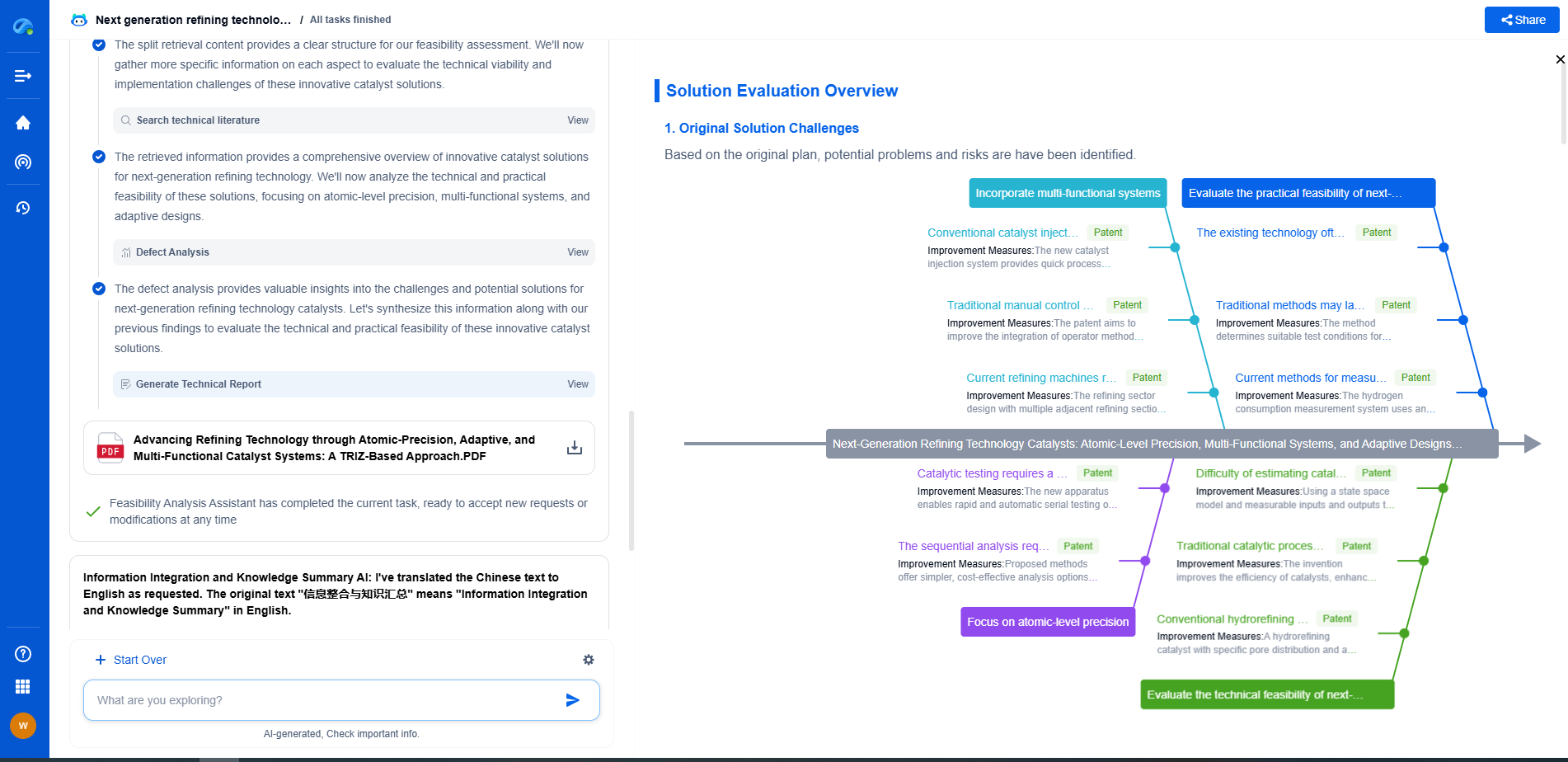What Are Polymer-Based Coatings and Adhesives?
JUL 3, 2025 |
Polymer-based coatings and adhesives are integral to a myriad of industries, providing essential properties that enhance the functionality and durability of various materials. From automotive and construction to electronics and healthcare, these substances offer versatile solutions to complex challenges. This blog delves into the world of polymer-based coatings and adhesives, exploring their composition, applications, advantages, and recent innovations.
The Basics of Polymer-Based Coatings
Polymer-based coatings are protective or decorative layers applied to surfaces to improve their performance or aesthetics. These coatings are formulated from polymers, which are large molecules composed of repeating structural units. Depending on their chemical composition and the specific requirements of the application, these coatings can offer properties such as corrosion resistance, UV protection, chemical resistance, and enhanced mechanical strength.
Types of Polymer Coatings
1. **Epoxy Coatings**: Known for their excellent adhesion, chemical resistance, and durability, epoxy coatings are widely used in heavy-duty environments, such as industrial flooring and marine applications.
2. **Polyurethane Coatings**: These coatings provide flexibility, abrasion resistance, and weatherability, making them ideal for automotive finishes and outdoor applications.
3. **Acrylic Coatings**: With qualities like fast drying, UV resistance, and high gloss, acrylic coatings are popular in the construction and automotive industries for both protective and aesthetic purposes.
4. **Silicone Coatings**: Offering superior thermal stability and water resistance, silicone coatings are often used in high-temperature applications and on surfaces exposed to extreme weather conditions.
Exploring Polymer-Based Adhesives
Polymer-based adhesives are substances used to bond materials together. They are designed to provide strong, durable adhesion across a variety of substrates, including metals, plastics, and composites. The versatility of polymer adhesives allows them to be used in many sectors, from manufacturing and construction to medical devices and consumer electronics.
Types of Polymer Adhesives
1. **Epoxy Adhesives**: Known for their high strength and resistance to environmental factors, epoxy adhesives are used in applications requiring robust bonding, such as in aerospace and automotive components.
2. **Polyurethane Adhesives**: These adhesives offer flexibility and impact resistance, making them suitable for bonding dissimilar materials and for applications where movement or vibration is expected.
3. **Acrylic Adhesives**: Valued for their quick bonding and UV resistance, acrylic adhesives are often used in the signage industry and in the production of lightweight structures.
4. **Silicone Adhesives**: Excellent for sealing and bonding in extreme temperature conditions, silicone adhesives are commonly used in electronics and appliances.
Advantages of Polymer-Based Coatings and Adhesives
1. **Versatility**: With a wide range of formulations available, polymer coatings and adhesives can be tailored to meet specific application requirements.
2. **Durability**: These products are designed to withstand harsh environmental conditions, enhancing the longevity of the materials they protect or bond.
3. **Efficiency**: Polymer-based solutions often reduce the need for additional mechanical fasteners, leading to lighter constructions and simplified assembly processes.
4. **Aesthetic Appeal**: In addition to functional benefits, many polymer coatings provide an attractive finish that can enhance the visual appeal of products.
Recent Innovations and Future Trends
The field of polymer-based coatings and adhesives is continually evolving, driven by advancements in materials science and engineering. Recent innovations include the development of eco-friendly formulations that reduce volatile organic compound (VOC) emissions, thus minimizing environmental impact. Additionally, smart coatings that change properties in response to environmental stimuli and self-healing adhesives that can repair themselves after damage are paving the way for more sustainable and intelligent applications.
Furthermore, the integration of nanotechnology into polymer coatings and adhesives is enhancing their performance by improving properties such as barrier resistance and mechanical strength at a molecular level.
Conclusion
Polymer-based coatings and adhesives play a crucial role in enhancing product performance across various industries. Their ability to provide customized solutions tailored to specific needs makes them invaluable in addressing modern engineering challenges. As technology advances, continued research and development promise even more innovative and sustainable approaches, ensuring that polymer-based products remain at the forefront of industrial and consumer applications.
Transform Polymeric Innovation with Patsnap Eureka
From biodegradable polymers to high-performance composites, the world of polymeric compounds is evolving faster than ever—driven by the demands of sustainability, functional customization, and global IP competition. Whether you're exploring novel copolymer architectures, optimizing polymerization techniques, or tracking material patents in bioplastics, time-to-insight is everything.
Patsnap Eureka, our intelligent AI assistant built for R&D professionals in high-tech sectors, empowers you with real-time expert-level analysis, technology roadmap exploration, and strategic mapping of core patents—all within a seamless, user-friendly interface.
Whether you're working on next-gen packaging films, bio-based resins, smart polymers for electronics, or new thermal-resistant composites, Eureka accelerates your journey from idea to patent to product—with unmatched clarity and speed.
🔍 Experience how Eureka can power your polymer R&D with AI intelligence—start your free trial today and unlock the future of materials innovation.
- R&D
- Intellectual Property
- Life Sciences
- Materials
- Tech Scout
- Unparalleled Data Quality
- Higher Quality Content
- 60% Fewer Hallucinations
Browse by: Latest US Patents, China's latest patents, Technical Efficacy Thesaurus, Application Domain, Technology Topic, Popular Technical Reports.
© 2025 PatSnap. All rights reserved.Legal|Privacy policy|Modern Slavery Act Transparency Statement|Sitemap|About US| Contact US: help@patsnap.com

